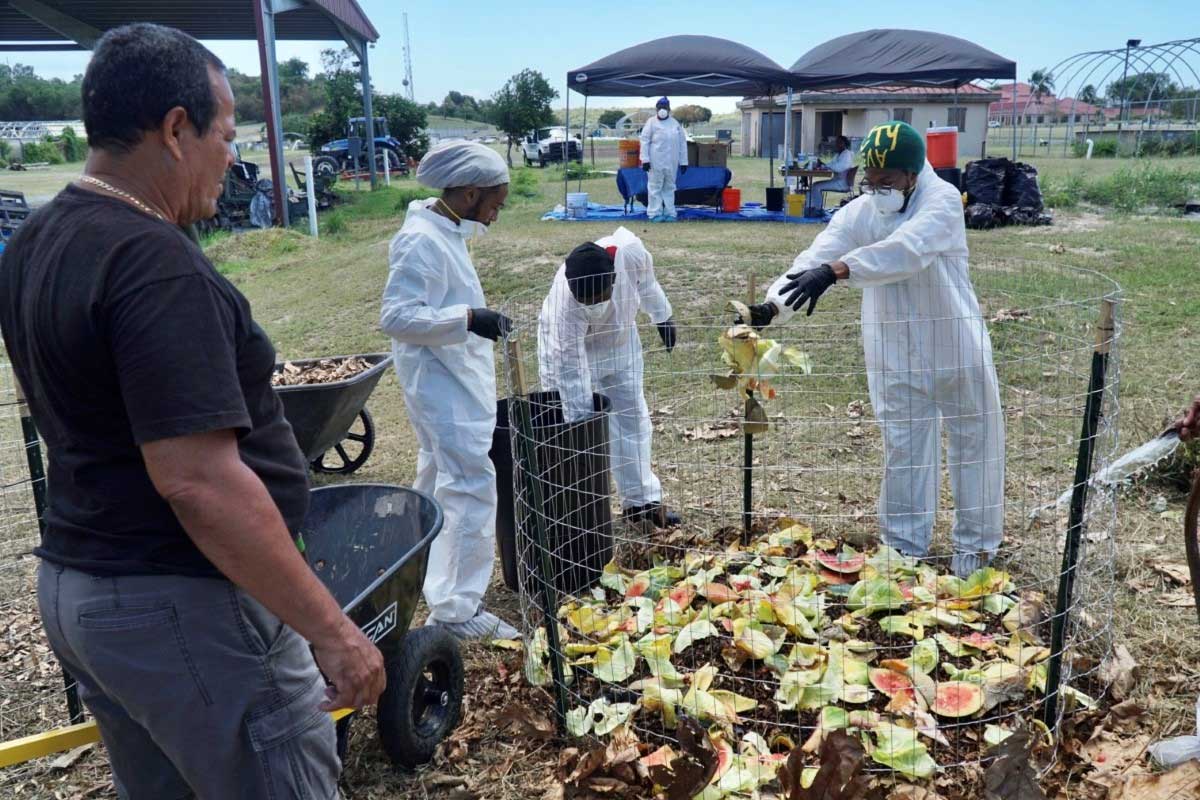
The University of the Virgin Islands’ (UVI) Caribbean Green Technology Center (CGTC) is on a mission to reduce food waste in the U.S. Virgin Islands by evaluating the feasibility and methods for reducing organic materials in the waste stream.
In the end of March, a small team of researchers, student workers, and volunteers led by CGTC Research Scientist Ariel Stolz, performed a two-week organic waste audit of eateries and supermarkets on St. Thomas (March 23-26) and St. Croix (March 30 - April 2) that gathered data on the type and quantity of organic waste produced in a 24-hour period. Organic materials include, but are not limited to, food waste, green waste (such as plant cuttings), lumber, and paper products. The audit is part of a larger project focused on providing technical assistance and training to the VI community on methods for diverting organic materials from the USVI’s waste stream. It is supported under a grant by the Rural Utilities Service, United States Department of Agriculture.
In 2019 CGTC, with funding from the Environmental Protection Agency (EPA), conducted a residential waste characterization study in the USVI. That study found that 31 percent of the waste produced by Virgin Islanders falls under organic waste, where food waste accounts for 12 percent of the total waste. These organic materials are taking up space in local landfills where they generate methane gas and toxic leachate (liquid contaminant).
The current study is aimed at finding feasible and cost-effective methods for the USVI community to instead divert these materials from dumpsites and use them to generate value through composting or energy production. After meeting with restauranteurs, Stolz found this topic to be high on a lot of peoples’ minds. “Most people are really interested in this topic once you get them talking, and many locals are already making efforts to reduce their waste output,” commented Ms. Stolz.
To ensure a successful audit, the researchers hit the pavement to recruit local businesses to participate and to explain the process, purpose and benefits of the audit. The researchers plan to provide the businesses with an audit report which will help them to see where they can reduce or divert their organic waste.
The waste collected during the audit was hauled to UVI’s campuses on the respective islands for sorting, weighing, and recording data. Justin Carven, the sustainable materials management researcher on the project, was really excited about the team’s progress and the valuable insight they gained through this experience. “Developing methods that divert waste from the landfill will be critical to a sustainable waste management plan. We believe that there are viable solutions that cannot only reduce waste but also provide economic benefits within the local community through the production of soil amendments and renewable energy,” said Carven. “Conducting this audit will quantify the scale of the challenge and is the first step towards identifying the best methods to address it.”
Through this process the team also learned about some of the initiatives to reduce food waste that are already in practice in the Virgin Islands. For example, some businesses have switched to to-go containers that are safe for backyard compost. Stolz noted, “On St. Croix we learned that many of the entities we surveyed already give away food scraps to local pig farmers at the end of the day.”
As part of the project, Stolz joined forces with the UVI School of Agriculture to build a compost demonstration that utilized the recovered food and paper waste from the audit on both St. Thomas and St. Croix UVI campuses with a special thanks to Dr. Louis Peterson, Dr. Henry Awika, Vanessa Forbes and Ephraim Rodriguez.
While this project is only beginning, these first steps are critical for understanding the type, quantity, and composition of the organic waste that is being produced by residential and industrial sectors of the Virgin Islands. Next steps will include a full analysis of various available technologies and their suitability for the USVI. For example, backyard composting of kitchen scraps is accessible to a significant number of homes.
The Caribbean Green Technology Center plans to host composting workshops to provide appropriate training and best practices to all interested parties. Composting kitchen scraps is a safe and effective way to both divert waste from landfills and add nutrients to a home garden or farm. This audit can also identify the few commercial farming operations where composted organic materials can be donated to greatly benefit the quality of the soil and therefore increase the crop output. “In a territory where less than 3 percent of food is grown locally, these soil amendments can be used to further the bona-fide farmers’ ongoing dedication to the fight for local food security,” Stolz said.
To get involved and learn more about this project, visit www.cgtc-usvi.org/organic-waste-audit.
For more information, contact pr@uvi.edu.